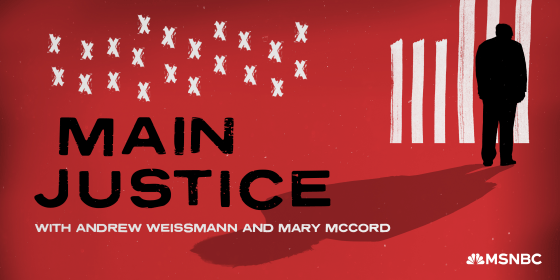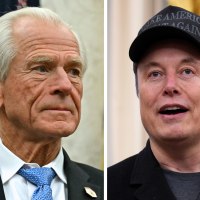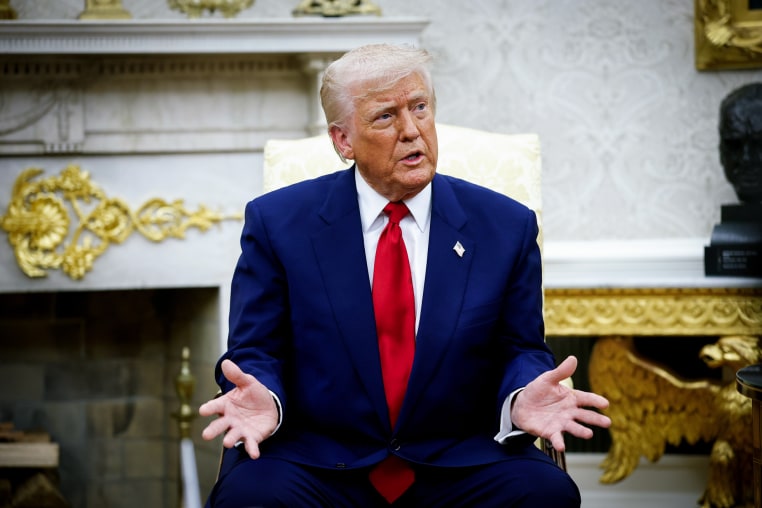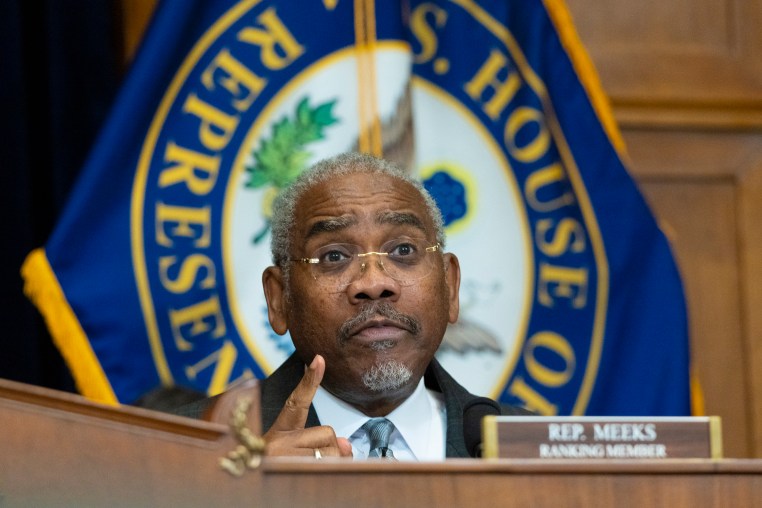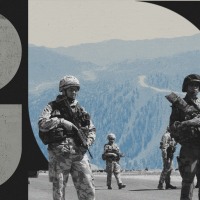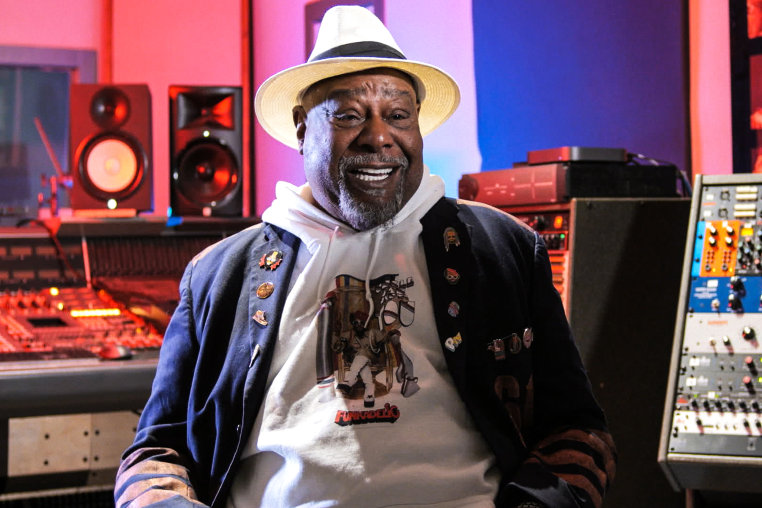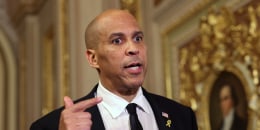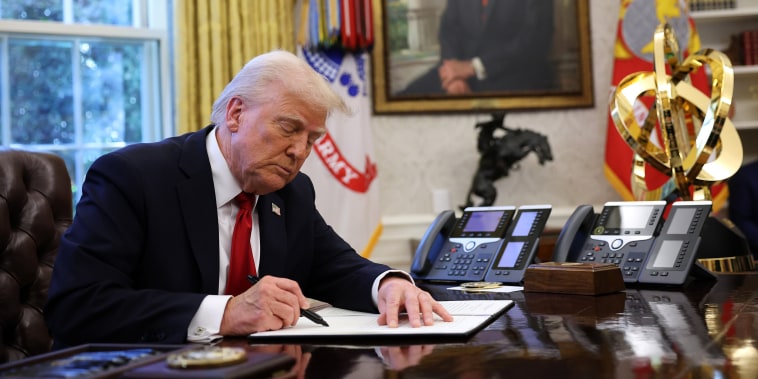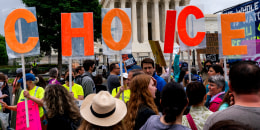Six emergency applications have now made their way to the Supreme Court concerning President Trump’s executive orders, so Andrew and Mary begin this episode by breaking down the emergency stay motions in several key cases involving birthright citizenship, federal workers, the use of the Alien Enemies Act and canceling education grants. Then, after a review of Trump’s latest law firm blacklist targets and the problematic nature of targeting of universities and students, they focus on an executive order aiming to change how U.S. elections are run. And last up, Andrew and Mary decry the lack of accountability over Signalgate, as Trump resists doling out any consequences to his senior National Security leadership.
For more on Trump’s continued attacks on universities, check out the latest episode of Trumpland with Alex Wagner about the fallout at Columbia University and maintaining free speech on campus.
Further reading: Here is the order from the DC Circuit Court of Appeals over Judge Boasberg’s TRO pausing deportations under the Alien Enemies Act, which includes separate concurring statements of Judge Henderson and Judge Millett and a dissenting statement of Judge Walker.
Want to listen to this show without ads? Sign up for MSNBC Premium on Apple Podcasts.
(MUSIC PLAYING)
Andrew Weissmann: Hello and welcome to “Main Justice.” It is Monday morning, March 31st. I’m still on assignment.
Mary McCord: You are still on assignment, so it’s early afternoon there, I guess.
Andrew Weissmann: Yes, so that’s it for the levity.
Mary McCord: Yes.
Andrew Weissmann: So, there is a lot going on. And Mary, before I ask you to sort of go over what we’re going to talk about, I mean, it’s really an interesting moment on this Monday morning because there’s a lot that’s happened since our last recording last week. But it, in many ways, is sort of a preview of things that are going to be happening within the next week or two weeks in terms of it’s both backward-looking and forward-looking. It’s just drinking from a fire hose, to say the least. A friend of Mary’s and mine sent around a cartoon of somebody with a fire hose that was just hitting him in the face. And it was like --
Mary McCord: That’s how it feels, yes.
Andrew Weissmann: Exactly. So, with that, what do we have on the dance card, Mary?
Mary McCord: Right. Jam-packed morning. And we will be releasing this a day earlier because of Andrew’s being on assignment. And so, that means a Monday release instead of Tuesday. So, we are going to first go to the Supreme Court because we are kind of getting to that point where there’s a number of things in front of the Supreme Court. There are six different emergency applications in the Supreme Court. This is something we anticipated given the, again, back to our sort of flood, deluge metaphor, the flood of executive actions and the corresponding responsive flood of lawsuits.
To enjoin that, we are now up in the Supreme Court on six matters. We are also going to talk about, again, we’ve talked about this, I think, every week for at least four or six weeks, Andrew, but this is this constant assault on lawyers and law firms and judges and now universities that have clinics that engage in lawsuits. A lot of action there last week with two immediate restraining orders, restraining two new executive orders, blacklisting law firms.
And then we really do need to talk about Trump’s executive order last week, about elections purporting to really establish new requirements for voting. And I think it’s really, really important for listeners to understand that there are limits on what a president can do by executive order. And I think there’s been a lot of reporting on this that’s suggested these things are now requirements. But the president, particularly in this area of elections where the states and Congress have the authority, is limited in what he can order. So we want to sort of level set on that.
And then we’ll do a little bit on the fallout of Signalgate, which we, of course, discussed last week in one lawsuit that already has resulted in some action related to that. But should we get started?
Andrew Weissmann: Yes, absolutely.
Mary, I thought one way to start, because we’ll turn almost immediately to the Supreme Court, but I thought it might be useful. Somebody who was one of our guests was Steve Vladeck, and he put together in his sub-stack something really useful. Steve just put together a compendium that essentially the numbers of how many judges have issued some sort of injunction, whether it’s a preliminary injunction or a temporary restraining order. See Mary McCord on what the difference is. But the number of courts that have actually issued injunctions stalling or stopping for the moment the implementation of executive action.
And I thought, Mary, it might be useful to start with that sort of as a quick list, and then we can sort of turn to the matters before the Supreme Court. Does that make sense?
Mary McCord: Yes. And the reason this is directly related to the matters in the Supreme Court is that in every single application for a stay in the Supreme Court, and that is when the government is coming into the Supreme Court and saying, “Court, you should stay the injunction issued by a district court below of this thing that the government wants to do.” In every one of those, because I looked at every single one, they are making the point that judges are being activists, that they are extending their authority beyond the authority of the judiciary, and they’re doing that by issuing nationwide or universal injunctions. And in every one of these applications, the government’s complaining about this.
And so let’s just set the record straight. Thanks again to Professor Steve Vladeck, my colleague here at Georgetown Law.
So he says so far he and his research assistant have identified 67 cases as of last Friday night in which district courts have either ruled in favor or against temporary or preliminary relief. And that is district courts have granted some type of preliminary relief in 46 of those 67 cases. That is close to 70 percent. And those 67 rulings have come from 51 different district judges appointed by seven different presidents sitting in 14 different district courts across eight circuits.
And why is that important? That’s important for one, because again, this criticism of activism suggests that it’s a handful of judges and that it’s this expansive, unlawful type of usurpation of executive authority by these judges. And I think this is just showing how expansive and how diverse and diluted this is across the country. Now, there are more, of course, in D.C. because that’s the seat of the federal government. But it is across, as I just said, 51 district judges appointed by seven different presidents, Republicans and Democrats across 14 different district courts.
Now, people may remember during the Biden administration, there were a number of universal injunctions that were granted by judges. And those overwhelmingly came from a handful of judges in a single judge division within bigger districts in Texas. So that’s a place where you can go, you can file a suit, you can know it’s going to go to one judge, the judge of your, you know, your picking as the plaintiff. And in fact, a case that the Department of Justice filed late last week seeking to cancel or bar collective bargaining by different employee unions within the federal government was filed in one of those single judge divisions in Texas, as opposed to, for example, in the District of Columbia.
Okay, last thing I’ll say about this is, again, the government is in the Supreme Court in every single stay application arguing that, well, I’ll just read from one of them in the one of the birthright cases. Rule by TRO has become so commonplace among district courts that the executive branch’s basic functions are in peril. In the two months since Inauguration Day, district courts have issued more than 40 injunctions or TROs against the executive branch, whereas district courts issued 14 universal injunctions against the federal government through the first three years of President Biden’s term.
So that is what the government has said in pretty much words very much like this in each of these stay applications. What Steve Vladeck’s data shows is that last week, President Trump signed his 100th executive order in only 65 days in office. The previous record for executive orders during a new president’s first 100 days was 99, signed by FDR, that’s President Franklin D. Roosevelt, in 1933, and that was over 100 days, not 65 days. And to contrast more specifically with President Biden, because that’s the contrast that the government makes in these stay applications, President Biden signed only 37 orders during the same time period as now President Trump has signed 100.
So it is not as though courts are reaching for things to enjoin. They’re being inundated by the flood, by the fire hose of executive orders, which many of them are determining, exceed the president’s authority.
Andrew Weissmann: Yes. So the key issue here, the key debate is you have conservatives loyal to Donald Trump saying, oh, doesn’t this show activism by these judges who are issuing some sort of injunctive relief? And the reason Steve’s data is useful is it shows that the contrary seems to be the case, which is it’s not a question of political party and politics and the view of the judges saying, oh, I’m going to be activist, as opposed to the nature of the executive order. Because obviously, if the executive order violates some law, including the Constitution, then you could expect judges to react that way. And you’re seeing judges, regardless of who appointed them, you’re seeing a whole range of judges issue these injunctions, which would suggest that the better of the argument is that it’s the nature, and then the substance of what is being ruled on.
One quick point, which is there’s a lot, and this is sort of a good segue to the Supreme Court issues. There’s a lot of procedural issues that are being raised before the Supreme Court in each of these cases. And the issue of nationwide injunctions should not be, that is a valid issue that people have talked about for a long time. There are nationwide injunctions that are ruled on in favor of conservatives, as you noted, Mary, when President Biden was president, there are nationwide injunctions in connection with the birthright citizenship cases. That issue about what to do with nationwide injunctions and whether they should be allowed, and even if they’re allowed, under what circumstances they’re allowed, that is what I could say is reasonable minds could differ, but that should not be confused with the merits.
That’s a procedural issue about how broad an injunction should be, like what the scope is.
Mary McCord: A relief issue, scope of relief, exactly.
Andrew Weissmann: Exactly. So that’s maybe a good way to turn to something, Mary, that I’m going to ask you to talk about, because this is where it’s like, let’s go straight to the horse’s mouth, because you’ve talked about the birthright citizenship case that ICOP is involved in. There are other birthright citizenship cases, but this is one of the issues that’s now before the Supreme Court. So tell us about that. What is happening there? What is the briefing? What do you expect in terms of when it will be fully briefed and any sense of when you think the court will be ruling on this?
Mary McCord: Right, sure. And some of this, of course, is a recap from last week, because we knew already last week when we had our podcast that the issue in the Supreme Court on those three cases, all involving emergency applications for stays from the nationwide universal injunctions issued by three different district courts in different areas of the country, and each one in which the circuit court for that district, the ninth, the first and the fourth, refused to stay those injunctions. Those are now in the Supreme Court purely on the issue.
Andrew Weissmann: Sorry, sorry. I was going to just say it’s a little bit confusing because the lower courts have stayed what the executive branch wants to do. But now the government is in the Supreme Court asking for a stay of those days, meaning that they can go forward because the stay that was granted below, they are asking to have that itself stayed.
So it’s a little confusing.
Mary McCord: It is. But that’s why we use that term injunction for the district court instead of stay, because they kind of have the same. It means you’re staying. You’re stopping the executive order. But it would get so confusing for the reasons you just identified to be like stay of a stay. So stay of the injunction.
So the only issue really in the Supreme Court on these birthright cases is the scope of the relief. The government, and this is important, is not actually right now contesting the merits of whether the president’s executive order about what the 14th Amendment means is right or wrong. They are saving that issue. And that’s an interesting thing because one might think, well, wouldn’t it kind of matter to the Supreme Court about whether you’re going to stay the nationwide injunction? Wouldn’t the court want to know something about the merits of the argument and whether the government’s likely to win? And that is something that is going to be at issue as these cases are briefed. Our brief and the brief of all of the plaintiffs is due this Friday. And so we’ll see a ruling at some point after that.
The three other cases that I think are really important that are up also in the Supreme Court right now pending government emergency applications either to stay the injunctions from below or to just vacate the injunctions below sort of run a gamut. One is seeking to stay a district court’s order from out in California that ordered the government to rehire probationary employees who had been fired from six different federal agencies in February. That’s like over 16,000 probationary employees. That is one we talked about, I think, a couple of weeks ago where Judge Alsup had some really key language for the government in his ruling.
Andrew Weissmann: That’s a polite term.
Mary McCord: Yes. He was not buying some of what they were selling. But the issue there is really in many cases, one of the issues there is were the plaintiffs the right plaintiffs? Right. We’ve talked about standing before. This was not actually brought by the employees themselves, the employees who had been fired. This was brought by nonprofit groups who would be very much impacted by all of these firings. And so I think one of the biggest issues there is standing. And that’s what the government is really arguing up in the Supreme Court. In addition to its argument about there shouldn’t be universal injunctions, as I indicated.
The other of the last three cases that we should talk about, because there are six pending right now, are about the injunction barring the government or requiring the government to reinstate Department of Education grants in two big programs that help teachers. This is, again, another issue where these grants were terminated almost like with no notice. And there was a lawsuit about them. And a Boston judge ruled that these had been unlawfully terminated. It’s about more than $65 million in training grants, again, that are really meant to address teacher shortages and things like that.
And so the judge then ordered that those grants must be reinstated. He did that across the board nationwide. That is another case that is now up in the Supreme Court. This is one where actually not only do we have the government’s motion right now, and this is really arguing that the plaintiffs can’t rely on the Administrative Procedures Act and whether this is arbitrary and capricious under the Administrative Procedure Act, that they shouldn’t be able to rely on that to get a nationwide injunction, that case is about contracts and grants, should have to go through the Court of Federal Claims.
So a lot of the government’s arguments there about procedurally this is the wrong vehicle for this. And the plaintiffs have filed their opposition on, I think it was Friday. And so we could hear very quickly from the Supreme Court on that one.
The last one, Andrew, I think is the most important. And I don’t know if you agree with me. It’s the one we’ve been talking so much about. And that has to do with a motion to stay Judge Boasberg’s temporary restraining order under the Alien Enemies Act, restraining the government from deporting Venezuelans alleged to be members of a foreign terrorist group, deporting them without any kind of notice or due process opportunity to contest their deportation and deporting them to a prison in El Salvador. So much has happened in that case. But in the Supreme Court, this is all about, again, an argument that the government’s making. He shouldn’t have been able to do this universally.
Now, he did it as a class, a class action, not a universal injunction. And they’re arguing essentially that that was an end run around sort of restrictions on universal injunctions. And they argue that really make a full-throated argument that his rulings usurp on the executive branch’s imperative and conclusive, like we’ve talked about so many times, conclusive and preclusive executive authority when it comes to national security and foreign policy and delicate negotiations with El Salvador to receive these deportees.
Andrew Weissmann: So one thing that’s quite interesting about all of these cases is we’ve talked about the district court injunctive relief. And just to be clear, preliminary injunctions, it’s important to remember that this is sort of a preliminary assessment, but it is not after a full-throated factual recitation by both sides. Many of the district judges make it very, very clear that is what they’re doing, that these are preliminary as is allowed and actually required, and that the government’s able to later amplify the record.
But all of the cases that are now in the Supreme Court that we just talked about have appellate decisions now. And what’s remarkable to me is that even though they were appellate decisions, sometimes with dissents, that you have the appellate courts upholding the preliminary injunctive relief.
And a lot of times you might have a dissent, but it’s on a procedural issue. So for instance, in the Judge Alsup case, where she talked about Mary, the issue there and that it’s very much about standing. So that’s sort of a, we think of it as important because we’re lawyers, but I think for our listeners who are not lawyers, they’ll be thinking of that as quite a technicality. But from the law perspective, it’s important that the plaintiffs have standing, have a stake in the game and an interest that the courts recognize.
And so the dissent in the appellate court on that was about whether the standing was proper, not about the substance of the ruling. And so I find that sort of fascinating.
Mary McCord: Similarly, the dissent, you know, in the Alien Enemies Act case, -this is one where--
Andrew Weissmann: Exactly. You know, Mary, it’s like we’ve done a podcast for a year and a half, almost two years.
Mary McCord: Almost two.
Andrew Weissmann: Exactly.
Mary McCord: We may have had two, because I think our first one was in March. I know we need to wrap this segment of the podcast, but I do think this Alien Enemies Act case is important for a number of reasons. The dissent we were just talking about in the Court of Appeals there, the TRO went to the Court of Appeals before the government took it up to the Supreme Court on an emergency motion. The dissent there said these should have been brought in habeas, that these should have been brought as individual claims by individual detainees before they were deported to say, “I can’t be deported and go in individually to court in Texas, because that’s where they’re being held in a detention center.”
That was rejected by Judge Boasberg below and by the other two judges on the Court of Appeals, the D.C. Circuit Court of Appeals, who said these can be done under different authority, not under habeas. And so that’s an issue that’s in the Supreme Court. And I think the other thing that’s fundamental here is Judge Boasberg, he even, in denying the motion to vacate his TRO a week ago today, said, “I’m only preliminarily suggesting that the government might not be able to meet its burden on the substance of whether there was an invasion or predatory incursion, whether Tren de Aragua qualifies as a foreign nation. But the main reason I’m denying this TRO is because there was no due process.”
Even the government admits that there’s got to be a process for a person to contest whether they can be deported under this authority, whether they are a member of the Tren de Aragua. And there’s been no due process here at all. That, also, the judges on the circuit, the two in the majority, agreed with that as well. And the reason I think this is so key is we are talking about basic due process rights, right? Before the government can pick you up and send you to a foreign country, to a prison in a foreign country, we’re talking about rule of law and due process rights. And that’s a right that everyone in this country has, whether you’re here lawfully or unlawfully. And that is something we’ll see even when we discuss the attack on lawyers after the break. That is something that comes up in that context and so many other contexts.
It’s fundamental, fundamental to our constitution and to our legal system.
Andrew Weissmann: I think on that, one thing we can do is we’ll link to our show notes to the two decisions by Judge Henderson and a concurrence by Judge Millett, because they really speak to that. Judge Millett very powerfully saying, you know, even Nazis right after World War II were given more process than you’re providing here. And Judge Henderson, who is usually deferential to the government in national security matters, she wrote a very long and powerful opinion.
And one of the things that she really takes issue with and goes through the history, which I think our listeners, we are assuming are like getting in the weeds. She really gives the history of the Alien Enemies Act and the other statutes that, by the way, have been found unconstitutional that surrounded it and talks about when it was enacted, what its purpose was at the end of the 18th century.
But when she talks about an invasion, she basically very powerfully lays out that it has to have a military component and that this, at least preliminarily, the record does not support what the government is saying here, that this is not a military invasion. And she says, I think in one of the more powerful, some might say, snarky comments, she says, you know, after going through the history and the text of why this gang is not invading the United States within the meaning of this statute, she says, what does the government cite to oppose that? She says they cite a contemporary dictionary, maybe one from our time right now, and they cite just a dictionary, and they don’t even cite the first or second definition of the word invasion. They basically just say, they cite a part of a dictionary that says, “If you’re here, but we don’t want you.”
Mary McCord: That’s right.
Andrew Weissmann: As part of the definition. And she said, well, under that theory, like, essentially everything’s an invasion.
I am just paraphrasing what is a much more beautifully written, beautifully thought-out opinion. I actually was really impressed with it. And so we’ll link to that. And so that is going to be very much front and center. As I think everyone who listens to this knows, our eyes and ears are very much focused on the Chief Justice and Amy Coney Barrett. I wouldn’t be surprised though on some of these issues if other justices, you know, and this might be Hope Springs Eternal, think that the government here, at least in this preliminary stage, have not supported their position adequately in the district judge’s courtrooms.
Mary McCord: And while all of this is happening, we still have not got a conclusion to the dispute over whether the government complied with Judge Boasberg’s order. The government gave the plaintiffs until today, later today, to file any response to the government’s assertion of the state secrets privilege, which of course we talked about last week. So that part of the case is proceeding sort of like on a separate track, whether the government violated the court’s order to turn any planes around, and the merits at this preliminary stage, only the preliminary stage, are in part up in the Supreme Court. Much, much more to come there.
All right, shall we take a break and come back to the attack on lawyers?
Andrew Weissmann: Let’s do it.
(BREAK)
Andrew Weissmann: Welcome back.
So let’s talk about the continued attacks on lawyers, law firms, judges, and as you mentioned, Mary, something we didn’t talk about, universities, because that is definitely going to be happening, and students at those universities.
One quick thing, because there are a number of things that happened with respect to law firms last week, and I’m sure a lot of our listeners are like, “Oh, yes, I know, because guess what? One of the podcast co-hosts,” that would be me, “was actually named in one of the executive orders.”
And I wanted to explain to our listeners why I’m not going to specifically be talking about that particular item. As we talked about in the past, and as we’re going to continue to talk about, we’re going to talk about the attacks on lawyers and law firms, and obviously, Mary, you can-- free to talk whatever you want, but I just wanted to explain to people, because they might be like, “Why are you not saying something about it?” And there’s sort of two reasons. One is, it is now very much in the courts.
Mary McCord: That’s right.
Andrew Weissmann: And so I don’t want to in any way, jeopardize that and have anyone say that I am trying to change the public opinion or do anything on this. It’s like, that is going to be addressed by lawyers in court, and that’s where it should be.
So that’s one.
And the other is, and I’m just going to be kind of frank about this, I’ll be damned if, even if it’s the President of the United States, that he’s going to rob from me my ability to be a legal analyst. I am not part of the story. I am here to be a legal analyst over what is happening in Maine Justice. And so, that’s what I want to focus on, and I want to maintain that sort of objectivity to talk about what is going on, and not have to me be the story, because that’s not what it’s about.
The big picture. There’s a lot going on that is about our fundamental legal structure and democracy. That’s the story. It’s not me.
Mary McCord: That’s right.
Andrew Weissmann: So, with that, we did talk about Paul Weiss, but since then, there’s been action with respect to two law firms. There’s a third law firm that “settled,” some would call it “caved.” So let’s focus on that and then what we’re seeing in universities. So, Mary, let me turn it over to you.
Mary McCord: I first want to kind of elucidate what you’re referring to about you being made part of this. In every single one of these executive orders that are blacklisting law firms, Perkins Coie, Jenner & Block, WilmerHale, and the new ones from last week were Jenner & Block and WilmerHale, every one of them starts off with this big, long Section 1, which is really just a diatribe against big law, and then we’ll get specific about things that the president doesn’t like about that particular law firm.
Those could be the things, including lawsuits that the law firm has brought, either against the Trump administration back the first time around, this time around, lawsuits, maybe, or just representation that the law firm has had representing Democratic candidates or Democratic causes and people who the president doesn’t like or doesn’t favor or his political enemies that have been lawyers at those law firms. Never mind that in most of the cases, not all, but in most of the cases, those people are not even at those law firms anymore.
In fact, Section 1 in each one of these executive orders is so explicit about the retaliatory nature of what is to come with the blacklisting that even Judge Leon last week in granting a TRO said the retaliation is obvious on the face of the executive order. And that is one of the things that is honestly so remarkable because again, these executive orders last week against Jenner & Block and Wilmer Hale came after Judge Howell had already issued a TRO for a materially almost identical, substantively almost identical order against Perkins Coie.
So the president knew a judge has found that two sections of that order unconstitutional violations of First Amendment rights, viewpoint discrimination, violation of First Amendment rights for suppressing speech and association, violation of due process. We just talked about that with respect to deportees, due process by blacklisting law firms so that any of their clients who have government contracts will really not hardly be able to rely on that law firm because the law firm’s being cut off from talking with a federal government or going into federal buildings and also violations of the right to counsel, among other violations. And still the president added two more law firms. And it seems like because we know that Skadden is negotiating a settlement, was targeting another and he may be targeting others. And I find that really astounding, although nothing should be astounding. At least I have a new word. It’s not extraordinary. It’s not remarkable. It’s astounding.
Andrew Weissmann: So one of the things that you noted is that you now have three different district court judges, and we know this from our background, but Judge Leon is probably viewed publicly as the most conservative of those judges. He was randomly selected. And then Judge Bates, former chief judge, he was formerly the head of the FISA court as well, like Judge Boasberg was on the FISA court. And Judge Bates, who’s sort of a, I would say it sort of seems like a moderate Republican nominee.
Mary McCord: Yes, he was a Republican appointee.
Andrew Weissmann: Appointee. And so you have three different judges, not just Beryl Howell, on, as you said, the very same issue, all issuing these temporary restraining orders on various aspects of these executive orders.
One thing I just wanted to foot stomp, which is I want to make sure people understand big picture what is going on. And I’m not focusing on Jenner specifically. I’m just focusing in general on this issue, which is law firms are private parties. Under the Biden administration, he was under attack for taking actions to have private parties toe the line on what the sort of far right viewed as saying, if you don’t do this, we’re going to take action against you and viewing that as something that was improper. And now, it is these are private parties. They’re entitled to do whatever they want within the law.
So what that means is there’s nothing that one of the attacks that you’re hearing just in general, whether it’s on universities or law firms, is this idea that they’re partisans. They’re not taking cases that are bipartisan, that they’re somehow being partisan in their work.
Mary McCord: They don’t have an obligation to be.
Andrew Weissmann: Exactly. Private parties are just like you and me, Mary. If you want to be pro abortion, if you want to be anti abortion, if you want to think that we’re not enforcing immigration laws harshly enough, if you think it’s too harsh, whatever, as long as it’s within law, you’re entitled to do that. Law firms, universities are not required to say, oh, wait a second, but we are doing this in a bipartisan way. And that means the government can’t be saying, well, the thing we don’t like about you and the reason we’re taking action is because you are not doing something bipartisan. They are not required to if they are a private party.
Now, it can be different if they’re not a private party, if they’ve got some obligation. But here, I just want to make it clear, because I think that one of the things we’re seeing is the moving of the goalposts that the people being a little defensive, thinking, oh, wait, let me show you that I take on issues that help the right and the left. And that may be true. I’m not in any way saying that that’s not an accurate thing to say. It’s just that that’s not required. I think it’s more accurate to say it’s none of your business.
Mary McCord: That’s right. And that’s one of the things that I think bothered us so much about the Paul Weiss settlement and at least the alleged Skadden Arps settlement that they will devote in the case of Paul Weiss, $40 million over four years to pro bono matters in areas that are administration priorities. Now, they say those are only areas that are also our priorities, like veterans’ affairs and things like that. But it feels like not right at all.
The other thing I think that people should understand, because I think this is really important, these two new TROs last week, the complaints and motions for temporary restraining orders were filed the morning of Friday, March 28th. They originally filed them as a related cases to the Perkins Couie case in front of Judge Howell. Judge Howell said these involved different facts. The executive orders are almost the same, but they involve different facts in terms of each law firm being situated differently. So I’m not going to handle all these. That’s why one went to Judge Leon, one went to Judge Bates.
Both judges scheduled hearings the same day, the same day, had those hearings and issued those TROs the same day. That is how much of an affront to the entire legal system this is. You’ve got judges, again, appointed by presidents across parties, and I think it is completely meaningless in this case because they realize if the legal system, if lawyers and law firms can be targeted and retaliated against, including in ways that would make a law firm go under, be unable to survive, if they can target law firms like this, our entire legal system will collapse. There will be no lawyers willing to take on causes that challenge the administration or employ lawyers that the president doesn’t like.
And we’re talking about judges who preside over litigation, cases brought in their courthouses that requires an adversarial process, a process of a lawyer on one side and a lawyer on the other side. And the judge or the jury, if it’s a jury trial, has to determine what the facts are. The judge determines how the law applies, and you get a result as a result of this process. And this process requires lawyers on both sides. And to demonize and penalize lawyers that would take one position, that is anathema to the very basis of our system. It’s what it is built on.
And so I am not at all surprised to see such speedy action. I am impressed with the judges on a Friday night, right? And in Judge Boasberg’s case, different type case, it wasn’t about lawyers, but on a Saturday, like these judges, when they see something that they think is just a true emergency. And the reason the law firm issues are true emergencies is because if allowed to go into effect, where lawyers at these firms can’t go in government buildings, can’t speak to government attorneys and their businesses are built on, you know, government contractors as clients, others with business in front of the government as clients, even defending white collar defendants and other defendants in front of the government, that means they just can’t do their job. And that’s where they’ve taken it so seriously.
Andrew Weissmann: And one of the things to note is that, you know, each of the three law firms that have brought cases are represented by law firms. So that’s actually six law firms. And one of them is notable.
I should say this. One of them is particularly notable because I don’t mean to denigrate anybody else, but Paul Clement is representing WilmerHale. And Paul Clement, for our listeners, is probably the preeminent Supreme Court advocate, conservative advocate, or known as a conservative advocate. He was the former Solicitor General, highly regarded. He actually was brought in as the amicus in the Mayor Eric Adams case.
Mary McCord: That’s right.
Andrew Weissmann: It’s the district judge there needed an amicus, and it was Paul Clement who was brought in. That’s the nature. That’s the stature he brings. And so to me, that is a signal of the sort of bipartisan concern about what is going on here.
An equal area, because obviously we’re lawyers, but you know what, Mary, you and I are also working for academic institutions, Georgetown and NYU, but there obviously are many, many, many fine and wonderful colleges and universities across the country. And they are extremely worried and have seen already what has happened with respect to Columbia, my alma mater. Mary, you have seen, and we’ve talked about what has happened with Georgetown, with respect to the US Attorney in D.C. Now there are reports of Congress asking a lot of detailed questions that are concerning with respect to Northwestern, and it is something what I would say is let’s keep an eye on this and let’s keep it on the radar screen, because everything that we’re saying about lawyers and law firms is going to come back and it is going to be a big issue on university campuses, on action taken.
Obviously we’ve seen a lot with respect to students, I think we’re going to see more with respect to student loans, and there’s an executive order that’s suggesting at least that student loans may be revoked if the student is engaged in what may be sort of First Amendment activity, but it leads to a trespass or some kind of violation, and that could also be action taken with respect to, as we saw at Columbia, the universities, and the issue is one where is this sort of a ruse to get universities to use this coercive power to curtail academic freedom.
And this is one where I am such an egghead and a nerd, and I revere each and every one of the academic institutions that I’ve either been at as a student or have been fortunate to be part of as a teacher, and academic freedom is a core principle of our democracy, and Mary, you and I know that what we talk about with our students is to have them think for themselves and to use the tools to think critically and to be able to think about things in a true bipartisan way and not to be channeling them towards one view or another, and that is what academic freedom is supposed to be about and to give people those critical tools.
This, to me, is as concerning as what we’re seeing on the lawyer and law firm front.
Mary McCord: It is, and I want to spend more time on this when we can. I did see Marco Rubio, the Secretary of State last week, said that more than 300 student visas had been revoked of those that he is deeming a national security threat. These are, at least the known cases, are cases of people who were engaging in First Amendment rights, activism, then, of course, as you mentioned, there was the power of the purse, the threats of cutting off funding to Colombia, so that’s an important, although power of the purse is Congress’s power, but it’s the president who threatened it, and then what we’re seeing with respect to law clinics, this letter from members of Congress to Northwestern University about the representation that its civil rights clinic and other clinics within the law school, again, this is very much like the blacklisting of law firms, it’s asking a bunch of questions about, again, this is not coming from the president, though, this is coming from members of Congress, asking questions about particular legal representation that it doesn’t like, and that’s getting, as you just said, to the heart of sort of law, and it’s the way that so many law students learn, get practical experience before they become licensed lawyers is through that clinical experience at law school where they actually represent parties in court.
Andrew Weissmann: And these clinics, just to be clear, I’m not saying each and every one of them, but a lot of them are there to provide legal help for people who don’t have lawyers and can’t get lawyers because of the financial structure.
You know, our Constitution provides that you have to have a lawyer in a criminal case, and if you can’t afford one, one will be appointed, but there are all sorts of matters that are so important where there is no right to counsel, but having counsel when the other side has counsel because they can afford it is so necessary. I mean, one quick example, landlord-tenant work in New York City is one where--
Mary McCord: That’s right.
Andrew Weissmann: I spent a lot of time, actually, people always think of me as like a criminal lawyer, but I’ve actually spent a lot of time in landlord-tenant court. Tenants, if they don’t have counsel, it is so hard for them to win and prevail and not be preyed upon. And again, all it’s about is just having counsel to voice the arguments, and then the judge will decide. If it’s not meritorious, so be it, but so there isn’t that gross disparity.
Anyway, this is sort of putting a pin in an issue that we really want to make sure everyone’s focused on. It’s clearly going to be one that’s going to be concerning and growing, so we will come back to it. Don’t worry, this is sort of a, I hate to use this phrase but amuse-bouche.
Mary McCord: Oh, gosh, yes.
Andrew Weissmann: Appetizer. It’s just give you a taste of what the issue is.
Mary, should we take a break and come back and talk about our third segment? And I hate to say this because it’s like, oh, now we’re going to talk about something lighthearted.
Mary McCord: Right.
Andrew Weissmann: Stay tuned for something equally disturbing and important to know about.
(BREAK)
Andrew Weissmann: So Mary, two things. One is the president issued an executive order about elections, and this is one where I don’t think we can get into all of it right now, but I’m going to give you my quick take because there’s many, many different aspects of this, but he says he’s concerned about sort of election interference.
If you want to know what puts the lie to that in my view, Pam Bondi on her first day as attorney general dismantled the election interference group at the department, and that’s true also with CISA at the Department of Homeland Security, a group that also monitors elections. And so if this was really about wanting to prevent election interference in a bipartisan way, why would you dismantle and take away those tools that the department has created to both prevent foreign election interference and the group at the Department of Homeland Security that is tasked with doing this?
Do you think I’m being too cynical that there has to be something else going on here because those are antithetical steps?
Mary McCord: Yes, I think my answer is yes, you’re right. It seems like something else is going on here. And that something else seems rather obvious when you start to look at other parts of this executive order.
But I want to start with the global point, which is that the president can’t do everything that I think this president thinks he can do by executive order. And even here, when you parse it apart, I mean, what executive orders can do is they can direct executive agencies and departments and executive officials to do certain things to carry out the order, but they don’t make law themselves, right? Congress makes laws passed by both houses of Congress, signed into law by the president.
So there are things in this order that the president certainly wants to happen, and two in particular that I want us to talk about, but it doesn’t mean he on his own can make them happen.
So the two things he really wants to happen are that votes will not be counted if they arrive after election day. So he’s purporting to designate the day that is election day, which already is designated as election day, as sort of the last day on which any votes can be counted, even if mail-in votes are postmarked before election day. So his view is if it comes, in fact, it’s kind of, I just think, ridiculous, the explanation here he gives in the executive order. So what he says, “It’s the policy of my administration to enforce the statutes that govern election day and require that votes be cast and received by the election date established by law. To do otherwise,” he says, “to accept votes that arrive after election day, even if postmarked before election day, would be like allowing persons who arrive three days after election day, perhaps after a winner has been declared, to vote in person at a former voting precinct, which would be absurd.
No, it’s not like that at all, because in fact, you voted before election day, before a winner was declared, and the mail, which let’s table for a moment, you know, cuts and downgrading of services by the U.S. Postal Service, the mail just didn’t get it there in time.
Andrew Weissmann: So, I mean, let’s leave aside all of the people entitled to vote who are civilians overseas. But you know who votes and it takes a while for their votes to come in and be counted, but they vote before the election? Members of the military.
Mary McCord: That’s right. So are we going to deny their vote if it doesn’t get to the ballot counting venue until after Election Day?
Andrew Weissmann: This is one where if you thought this was true, this is part of the ineptitude that really bothers me that goes along with sort of the legal issues. And then there’s sort of policy issues and there’s ineptitude issues. And if you thought this was what you wanted to accomplish, you’d think you would work with Congress to say, this is the goal and we need a lot of money because we need to make sure that the people overseas, particularly our military, are not disenfranchised.
And thus, we’re going to need to have systems in place to get those votes in by Election Day. That’s the way you would try and do this. So much of this is just ham-handed.
Mary McCord: So the second thing that I think is revealed in this order is the president’s effort to try to require proof of citizenship by some sort of documentation before one can vote in a federal election. And notably, there are a number of documents that he says would be sufficient, a passport or a real ID, driver’s license or a military identification card. Do you know what is not included on that list?
Andrew Weissmann: What?
Mary McCord: A birth certificate. A birth certificate, right? What has been recognized as proof of citizenship since like all of modern history and what is at issue, of course, in the birthright citizenship executive order and the case is challenging that. So it’s almost like he’s already trying to implement, in many ways, part of that order saying we’re denying birthright citizenship to certain children of certain people who are not either LPRs or citizens, and we’re not going to accept that.
Now, nevermind that, guess what a passport’s based on? A birth certificate. Guess what a real ID is based on? A birth certificate. Okay, but that’s something he’s trying to do there.
Now, just to get back to the point I made at the beginning of this discussion that executive orders are not law, this is where I think there’s been some misreporting. The reporting suggests these things are now required. The president doesn’t have authority over what the requirements are for federal elections. That is a matter for Congress and the states. Under the Constitution, it is the states that choose the times, places, and manner of holding elections for senators and representatives, except that the Congress may overrule and apply a law. So this is up to the states and to force the states, in fact, this requirement would force a state official to sign off that the state official or the local official had actually observed, taken a look at that documentation of citizenship, signed off on it. That would be commandeering the states to do something that’s within their power. There’s all kinds of constitutional problems with it.
Same with the effort to coerce on this issue of when you could count ballots received after election day. So these are not current requirements. He’s trying to use different procedures like cutting off funding and things like that. But this is something that will be challenged and should be challenged. And so people should not think right now that that is what’s going to be required at the next election.
Andrew Weissmann: And stay tuned for litigation as we go forward, talking about the disparate impact on communities here, because not surprisingly, these are not steps where the impact is falling in at least, I suspect we’re going to hear this, it’s not falling in an even-handed way on sort of Democrats and Republicans.
And so, again, we’re putting a pin in those topics.
Mary McCord: Yes. So let’s turn now to Signalgate.
Andrew Weissmann: Yes, exactly. And I have yet another anomaly for you. So riddle me this. We talked about the state secrets privilege in Judge Boasberg’s case where he’s trying to figure out was there a violation of his order? Huge issue. This is not, remember, the government said this is a picky issue. No, no. This is about whether we have a constitutional crisis because they just deliberately violated his order. It’s that question. We don’t know the answer to it, but that’s the question. It is not a picky question to know whether the government has violated deliberately a judge’s order.
And they have asserted state secrets saying that telling you, among other things, sort of when planes take off and who was on them and where they were and when they’ve landed, that’s so sensitive that we’re asserting state secrets.
By the way, it’s so sensitive even if we tell you judge in chambers privately. We can’t even do that. So that’s one government position.
Now contrast that with the government position on the Signal chat, which I hate calling it a chat, the discussion on Signal, the panoply of the most senior people but the president of the United States, the vice president, the secretary of defense, the national security advisor, I’m seeing your cabinet officials discussing war plans by all accounts. I mean, we’ve seen that what’s been reported about what those discussions were about when planes would take off and what they were targeting is the reporting.
That is something that the administration says is not classified. It’s not even classified. Let’s see your prior administration officials talking about how, of course, that’s classified. I mean, as it would be, these are war plans.
Mary McCord: Of course it’s classified.
Andrew Weissmann: And so how do you take those two positions? And how does Judge Boasberg ignore that, by the way? It’s like, how do you say this is state secrets, but when you’re discussing war plans, that’s not?
And Pam Bondi, it’s been reported, is unlikely to be opening a criminal investigation. And she seems to have concluded already. She said, and this is the quote that’s attributed to her. It was sensitive information, not classified and inadvertently released. So I’m not really sure how, without an investigation, you know that it was not classified and also that it was inadvertent because I mean, the Signal chats seem advertent to me. I mean, it was clearly intentionally put on the Signal. It’s not like they didn’t know that.
But anyway, Ms. Bondi is quoted as saying it was sensitive information, not classified and inadvertently released.
Mary McCord: You know, to that first point, Andrew, as I mentioned, you know, on one of the news programs last week and as I was sort of cringing listening to this argument that this information isn’t classified, all the lawyers in the Department of Justice who have defended classified information against disclosure, whether it’s through FOIA requests, those are freedom of information requests where they’re saying we can’t disclose that because it’s classified, it’s sensitive, et cetera. Defending state secrets in litigation, saying we can’t disclose that because it’s a state secret. Their litigating position when it comes to sensitive national defense information and classified information has just been seriously undermined because next time they’re trying to protect the same type of information, it’s going to be a lot harder.
And so this sort of temporary fix to what they perceived as a political problem has some real legal ramifications. And I’m sure DOJ attorneys are just thinking, oh, my gosh, what have you done here? Not to mention the significance to the intelligence community and national security officials for the same reasons.
Andrew Weissmann: So, Mary, this is great because we both covered a lot of the backward looking, but there’s a lot that is going to be happening this week. Hopefully, listeners, this gives you a bit of a primer. So as things happen, you know how to sort of slot it in. We’ll be back next week to sort of update people on where we are.
We also have some things that, you know, Mary, you and I desperately want to talk about and try to wait and find the right time and place.
Mary McCord: We always think next week and then by next week, there’s like a dozen other things. So it’s hard.
Andrew Weissmann: Yes, it is. So I will be back from assignment.
Mary McCord: Excellent.
Andrew Weissmann: I will see you on the other side of the pond. And in the meantime, thanks, everyone, for listening.
Remember, you can subscribe to MSNBC Premium on Apple Podcasts to get this show and other MSNBC originals ad free. You’ll also get subscriber only bonus content.
Mary McCord: Also, remember to send us a question. You can email us at mainjusticequestions@nbcuni.com. This podcast is produced by Vicki Vergolina. Our associate producer is Janmaris Perez. Our audio engineer is Katie Lau. Our head of audio production is Bryson Barnes. Aisha Turner is the executive producer for MSNBC Audio.
Andrew Weissmann: Search for “Main Justice” wherever you get your podcasts and follow the series.
